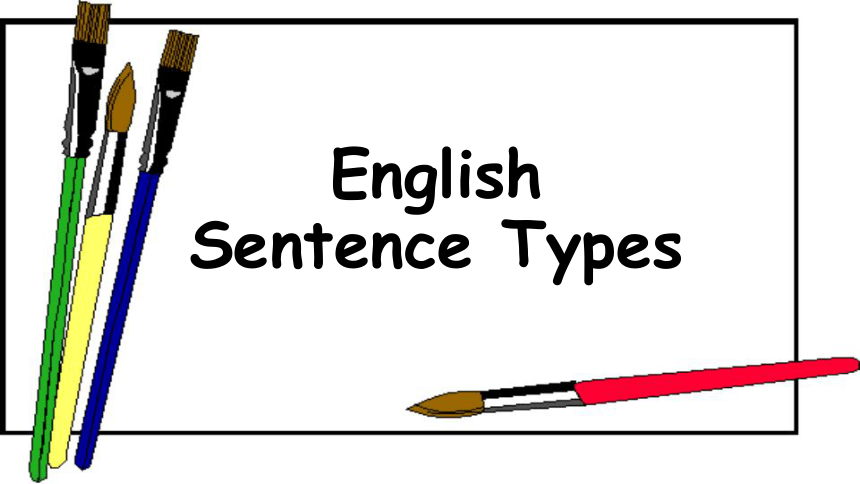(
课件网) English Sentence Types 简单句、并列句和复合句 (一)句子种类两种分类法 1、按句子的用途可分四种: 1)陈述句(肯定、否定):He is six years old; She didn’t hear of you before. 2)疑问句(一般、特殊、选择、反意):Do they like skating How old is he Is he six or seven years old Mary can swim, can’t she 3)祈使句:Be careful, boys; Don’t talk in class 4)感叹句:How clever the boy is! 2、按句子的结构可分三种: 1)简单句: 只有一个主语(或并列主语)和一个谓语 (或并列谓语)。 1. He often reads English in the morning. 2. Tom and Mike are American boys. 3. She likes drawing and often draws pictures for the wall newspapers. 2) 并列句:由并列连词(and, but, or等)或分号(;)把两个或两个以上的简单句连在一起构成。 e.g. 1. You help him and he helps you. 2. He wants to go there but I don’t 3. Hurry up, or you will be late. 4. This house belongs to Mr.Smith; It costs millions of dollars. Exercise: 请用合适的并列连词把每组句子合并为一个并列句。 He was tired, so he went to bed. 1. He was tired. He went to bed. 2. The child didn’t go out. He was afraid of the dog. 3. He made a promise. He didn’t keep it. He made a promise, but He didn’t keep it. The child didn’t go out, because he was afraid of the dog. 下列句子哪些是正确的? 为什么? 1. I like English, my English is very good. 2. I like English and my English is very good. 3. As I like English, my English is very good. 4. I have a house, its windows are very big. 5. I have a house and its windows are very big. 5. I have a house, whose windows are very big. 3)复合句:含有一个或一个以上从句的句子 。复合句包含:名词性从句、定语从句, 状语从句等。 1. The foreign visitors took a lot of pictures when they were at the Great Wall. (状从) 2. This is the book that I want. (定从) 3. I think that he is right. (宾从) In Adverbial Clauses状从: Before, after, when, while, as, since, until, till, if, unless, once,in case, in order that, so that, so…that, such…that because, as, since, although, though, even though/if, as if, as though, where, whether…. In Attributive Clauses定从: Which, that, who, whom, whose, when, where, why… In Noun Clauses名从: What , that, whether, if, how, which, when, why, where… Subordinating Conjunctions从属连词 句子类型 1、简单句:简单句只有一个主语(或并列主语)和一个谓语动词(或并列谓语动词)(六大基本句型不带修饰成分,或只带了定语,状语,同位语的词或短语)。如: I saw a student. /I saw a high student in the classroom. My brother and I go to school at half past seven in the morning and come back home at seven in the evening. 2、并列句:并列句由并列连词或分号“;”把两个或两个以上的简单句连在一起构成(and, but, or,so)。如: It is late , so we must hurry. 3、复合句:复合句中含有一个或一个以上的从句(以句子来代替一个成分)。如:If we want to keep fit , we must always remember that prevention is better than cure. 从以上并列句和复合句的例句来看,我们不难看出它们实际上是由几个简单句通过并列连词或从属连词连接起来的。 特殊:W ... ...

